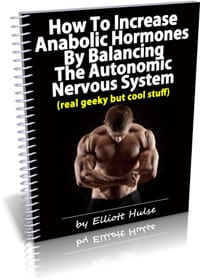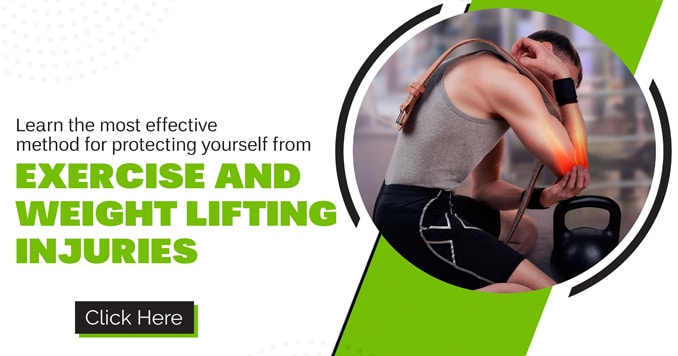

Below is part of the report written by Elliott Hulse on How to Increase Anabolic Hormones by Balancing the Autonomic Nervous System.
Hey, Elliott Hulse here.
The first thing I want to do today, guys, is to admit to a horrific mistake that I had been making about my training and lifestyle. And along with that admission, I’d like to apologize to you because my being in that state of imbalance has not allowed me to serve you and give you this information that I’ve been holding onto for so long. I didn’t feel proper teaching it to you if I wasn’t living it myself.
Training Mistake
My mistake with my training was that I was training way too hard. Now, I know that sounds ridiculous, sounds crazy, especially coming from a strong professional man who teaches baseball players and football players that I was training too hard.
My concern is that many of you may be doing the same thing. You may have been encouraged by me to do the same thing. But, the fact is that the training that I was doing was imbalanced. And granted, you’ve received a ton of benefits from transcending. The flesh and pushing through, and persevering and breaking your ass to get the results you want by working very, very, very hard in the gym, and I’m still a proponent of hard work.
Autonomic Nervous System
We’re going to talk about the autonomic nervous system here today. But, I want to teach you today how to balance that type of training and balance your hard work to get faster, longer-lasting, better results with less work. I’ll show you what I mean.
I like to think of the autonomic nervous system as a branch of your nervous system. If you understand your brain and spinal cord and all the nerves that shoot out of it, it works as an operating system for your body. I think of the autonomic nervous system as our automatic nervous system. It’s subconscious. It runs on its own without you having to think about it.
So, things like your heart beating or different metabolic reactions within yourself, breathing, hair growing, nails growing, skin, building muscle, repairing tissue and organs, and digestion. You don’t have to think about these things.
You don’t work out and then say to yourself, okay, I’ve got to remember to grow. I need your help. It happens automatically based on the stimulus that you provide. When you’re sick, you don’t have to remind yourself, immune system, please kick in. Or, when you’re sleeping at night, you don’t have to remind your heart to beat. These are all things that happen automatically. They’re running in the background.
Functions of Autonomic Nervous System
An interesting thing about the autonomic nervous system is that it will also respond to outside stimuli. For example, if someone scares you, they jump out of a bush and yell at you, your heart rate skyrockets, your eyes dilate, and you start breathing heavily.
I just described a reaction provided by one of the branches – you’ve got two branches – of the autonomic nervous system, which is called your sympathetic branch. You didn’t have to think about doing that, but there was an outside stimulus that caused that reaction. That’s called the fight or flight reaction if you are wondering. We’ll talk about that in a moment.
Importance of Autonomic Nervous System
“The reason why the understanding of our autonomic nervous system is so important for building muscle, for having vibrant, vital health, for increasing our sex drive, for having mental focus and clarity, for building the strongest versions of ourselves all around it because we can determine and we can choose the type of outside stimulus to balance the autonomic nervous system ourselves. We have the choice. We can do these things.”
For example, you don’t have to go to a scary movie with things popping up or jumping or gross, deformed images of people on a screen that will stimulate a branch of the nervous system that’s probably already over-stimulated.
You don’t have to watch the news that produces a part of the nervous system. These are all fear-based things. You can choose not to do those things. And you can choose to partake in activities, thoughts, behaviors, and exercises that stimulate the other set end of the spectrum that makes you feel good. I’m going to talk about that in a moment.
We need both branches of this nervous system. I just described the sympathetic component of the nervous system in pretty good detail, and now I’m going to explain the parasympathetic branch. As you see here, it’s almost like a seesaw.
Your body will choose based on your choices and the environment around you. So, automatically you’re going to be either in a sympathetic mode or you’re going to be in a parasympathetic way. Two can’t be going at the same time. And what’s going on to stimulate one end of the spectrum or the other?
Final Word
When you’re in sympathetic mode, the good part is that it provides energy, gives focus and concentration, binding natural powers of the mind, survival, fight, or flight. Like I told you before, if somebody walks in with a gun, you’re out of there or fighting. You’re fighting or resisting. It’s catabolic.
We tend to think of cannibalism in strength-building and muscle-building as bad. But, the truth is, you want to be catabolic to a degree because it will help stimulate the other end – and I’ll tell you what I mean in a moment – and also because it gives you energy. Just click here to read the rest of the report on How-to-Increase-Anabolic-Hormones-by-Balancing-the-Autonomic-Nervous-System-by-Elliott-Hulse.
Rick Kaselj, MS


